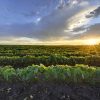Stories | April 25, 2017 | Read Time: 4 minutes
How Two Plant Scientists Saved a Billion Lives
By Fred Perlak
From Ancient Rome to present-day Africa and beyond, famine has left tragic marks throughout human history. In the mid-twentieth century, we stood at the edge of what could have been an unprecedented disaster: lack of food for as many as one billion people.
The work of two brilliant, dedicated scientists played a pivotal role in averting this impending disaster and developed wheat and rice varieties that withstand challenges that often destroy harvests. Their names were Dr. Henry Beachell and Dr. Norman Borlaug. Although the two worked independently, together they are credited with saving more than one-quarter of the world’s population at the time from famine’s deadly grip.
Wheat and rice are staples in the diet of more than half the world’s population. We appreciate the incredible value these grains provide in helping to feed the world’s growing population. That’s why we established the Monsanto Beachell-Borlaug International Scholars Program (MBBISP), which provides Ph.D. candidates with funding to conduct wheat and rice research in developing nations. Since the program’s inception in 2009, we have granted $13 million to 80 scholars from 28 countries across the globe.
These devoted students may be the next Borlaug or Beachell. Those are big shoes to fill.
Born on his grandparents’ Iowa farm in 1914, Norman Borlaug would go on to become a Nobel Laureate and recipient of the Presidential Medal of Freedom, the Nobel Peace Prize and many other honors. He is often dubbed the “Father of the Green Revolution.” His accolades are well deserved.
After earning his Ph.D. from the University of Minnesota and working in the private sector from 1942 to 1944, Borlaug turned down an offer to double his salary to take a research position in Mexico. There he developed wheat varieties that resisted disease and produced bountiful harvests. He spent much of the rest of his career introducing this hearty wheat, first to Mexico and then to countries around the world. One of Borlaug’s many remarkable successes was the doubling of wheat harvests in Pakistan and India. By the time Dr. Borlaug passed away in 2009 at age 95, he was widely regarded as a great humanitarian who contributed to world peace by helping increase the global food supply.
Henry Beachell was raised on his family’s wheat farm in Waverly, Nebraska. During his college years he envisioned extending his family legacy by breeding improved strains of wheat. Instead, he became known as the most important person in rice improvement in the world. He received the World Food Prize in 1996 and many other awards for his groundbreaking work.
Beachell began his career at the United States Department of Agriculture (USDA) where he worked for more than 30 years. But it wasn’t until he retired from USDA in 1961 and joined the International Rice Research Institute in the Philippines that he would achieve the breakthrough that solidified his place in agricultural history. He bred a rice variety that became known as “miracle rice” because it produced such extraordinary harvests. Beachell was also renowned as a mentor to other leading scientists. Indeed, he was still consulting right up to his passing in 2006 at age 100.
Who better to name a scholarship program after than these two agricultural icons? Perhaps one of our MBBISP scholars will one day have a similar impact on feeding the world. They’re already doing great work.
Bhoja Basnet, originally from Nepal, attained his Ph.D. in plant breeding with the support of MBBISP and now he’s working in Mexico to grow a more robust and sustainable wheat harvest. And this sampling of the 2014 MBBISP recipients demonstrates how this program is effecting real change around the world:
- Ms. Priyanka Gupta (India) — Laying the basis for a hybrid durum wheat breeding program.
- Mr. Marco Lopez-Cruz (Mexico) — Improving heat tolerance in wheat.
- Ms. Da-Young Lee (Korea) — Molecular breeding of rice using advanced technology.
- Ms. Palvi Malik (India) — Increasing harvests in a wild species of red rice.
The MBBISP is just one way we’re working with others to help feed a growing population. We’re also collaborating on drought-tolerant and pest-resistant seed varieties and pioneering data services and farming techniques that help reap plentiful harvests to help make a balanced meal accessible to all.
Learn more by checking out the Monsanto 2014 Sustainability Report: From the Inside Out.










